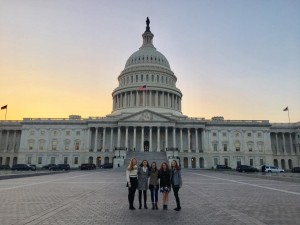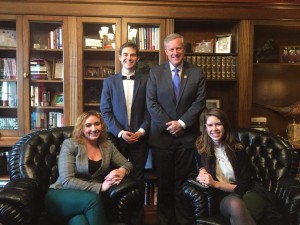Are you interested in connecting with your representatives on issues that matter to you? You can get in touch with the right person using our government official contact guide.
For some help figuring out how to approach advocacy on an issue, check out our advocacy basics training recorded here (or take a look at the slides here). You can also read below for some of the basics on advocacy meetings.
What is an advocacy meeting?
One of the most impactful ways to advocate for change is by meeting directly with your elected official’s office This can take place in Washington D.C. or in your own district.
official’s office This can take place in Washington D.C. or in your own district.
Basics
Asks: Your “asks” are your policy goals for the meeting. These are the actions that you are attempting to get your legislator to sign on to.
In the past, some of STAND’s asks have been “co-sponsor the Genocide and Atrocities Prevention Act” or “vote for the Global Fragility Act.” Always keep your asks in mind and tactfully steer the meeting in their direction. You want to leave with a position and commitment from the office.
LA and FPLA: Legislative Assistant & Foreign Policy Legislative Assistant. These are the people that you will most likely be meeting. It is rare to meet directly with your representative, but the LA will relay your messages. They are probably a young person from your area who is interested in foreign policy, just like you!
Apart from your asks, your other goal of the meeting is to begin building or continuing a relationship with the (FP)LA. They deal with many constituents on a day-to-day basis, and you want to differentiate yourself from others. If you show them that you are informed about what you’re asking for, they are more likely to listen to you about genocide and mass atrocity priorities both now and in the future. You should plan for the meeting to last about 20 minutes. It’s ok if the meeting is short; the staffers are very busy but they will take your asks into consideration.
Have your materials ready:
- Your contact info (on a business card if you have one)
- One-pager on the conflict(s)
- One-pager on your ask(s)
- Copy of the bill, if appropriate
- Photos of events, letters from constituents, petitions, local news articles about your chapter, or related groups/events
Basic meeting outline:
- Introduce yourself as a constituent and explain why this issue is important to you as well as to your district/state.
- Show that you’re there representing many voters. Describe your group as specifically as possible, including the number of members. Bring photos from events, petitions, copies of articles from a local paper, etc.
- Thank your representative
- Do some research beforehand to know their stances on certain issues and the way that they have voted on certain types of policies in the past. This will help you frame your asks in a way that appeals to their interests. Additionally, thank the official for any good work they’ve done on genocide prevention. This is important because it lets them know that their constituents are keeping an eye on their record.
- Give background
- It can be good to begin with a question – e.g., “How much do you know about what’s going on in Burma?” Give a brief background on the conflict – consult STAND materials for more.
- It can be good to begin with a question – e.g., “How much do you know about what’s going on in Burma?” Give a brief background on the conflict – consult STAND materials for more.
- Asks
- Directly ask them to take a specific action, referencing any legislation by bill number and name.
- (FP)LA’s are busy and have a lot of issues on their plate so you want to make it as easy as possible for them to do what you’re asking. Give them your sheet of asks with the important sections marked.
- Questions/Concerns
- If they seem hesitant to support your ask(s), ask them directly about their concerns and what you can do to make this easier for them – do they need more info about the bill? More evidence that this is important to voters? Then, after the meeting, send them that info.
- If you’re asked a question that you don’t know the answer to, say, “I don’t have that information now, but I can get it to you.” Be sure to send it to them after the meeting.
- Always listen. Listening to the (FP)LA’s concerns and priorities will help you meet their needs so they will want to work with you.
- Thank the staff
- Show your gratitude to the busy staffer. If they seem friendly, ask if they’d like to take a picture with you to remember the meeting!
The Follow Up
 Leave with a clear understanding of what the (FP)LA’s position is and what they will do. At the end of the meeting, let them know that you will be in touch with them soon via email.
Leave with a clear understanding of what the (FP)LA’s position is and what they will do. At the end of the meeting, let them know that you will be in touch with them soon via email.- Leave your contact info, and be sure to get their contact info too.
- Send an email afterward thanking them for meeting with you and provide them with any materials you promised.
- If they have done what you asked, kindly thank them and tell them that you will let the grassroots activists you’re in touch with know about their actions.
- If they have not done what you asked, ask what you can do to make this happen.
- Keep calling and emailing in the future. If you’ve established a relationship with this office, and they know they can count on you as a reliable source of information, they’ll be that much more likely to listen to you when there is key anti-genocide legislation up for a vote in the future.
